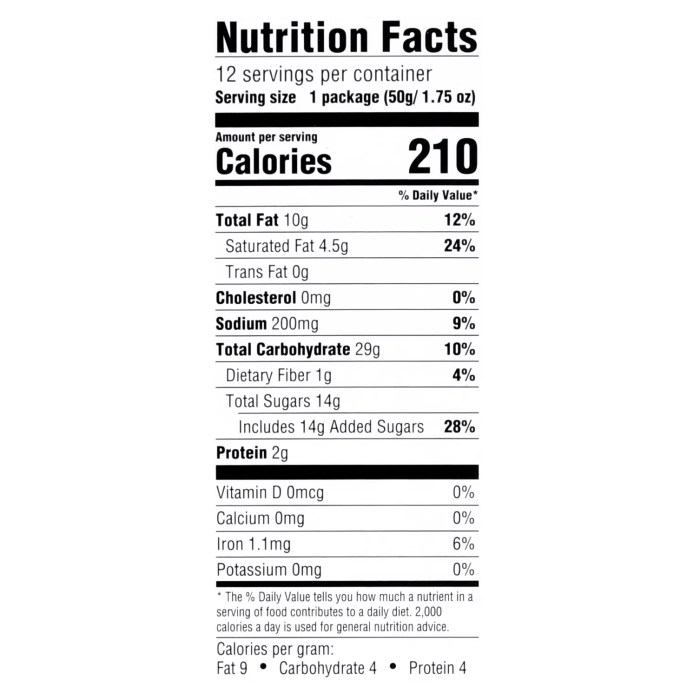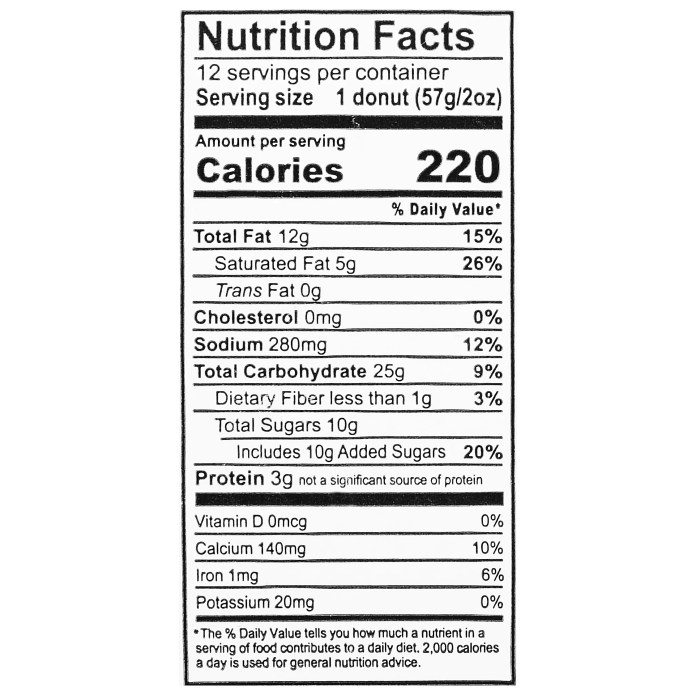
Impact of Donut Consumption on Health: Nutrition Facts Of Donuts

Nutrition facts of donuts – Yo, let’s get real about those sugary rings of death, yeah? Donuts, while undeniably delicious, aren’t exactly your mates when it comes to long-term health. We’re talking about the potential downsides of regularly indulging in these fried treats, from the immediate sugar rush to the long-term health consequences.Regular donut consumption packs a serious punch of sugar and unhealthy fats.
This ain’t just about a bit of a sugar rush; we’re talking about the potential for some serious health problems down the line.
Short-Term Effects of Donut Consumption
Think about that immediate sugar rush – it’s a rollercoaster. You get that initial high, followed by a crash, leaving you feeling sluggish and craving more. This energy rollercoaster can mess with your blood sugar levels, potentially leading to mood swings, difficulty concentrating, and even increased risk of type 2 diabetes if it’s a regular occurrence. Plus, let’s be honest, that feeling of bloating and heaviness after demolishing a couple?
Not ideal.
Long-Term Effects of Donut Consumption, Nutrition facts of donuts
Now, for the long game. Consistent high consumption of donuts, with their hefty doses of saturated and trans fats and refined sugars, significantly increases your risk of developing chronic diseases. We’re talking weight gain, heart disease (those clogged arteries ain’t pretty), type 2 diabetes, and even some cancers. Imagine constantly fueling your body with empty calories – it’s like running a car on cheap petrol; it might seem fine at first, but eventually, the engine’s gonna sputter.
Examples of Health Issues Linked to Excessive Donut Consumption
Let’s get specific. A mate of mine, let’s call him Dave, used to smash three donuts a day. Within a year, his weight skyrocketed, his energy levels plummeted, and his doctor warned him about his dangerously high cholesterol. That’s a real-life example of what excessive donut consumption can do. Another case, Sarah, developed type 2 diabetes after years of regular donut binges.
Heyo! So you’re checking out donut nutrition facts, huh? Those sugary treats are definitely tasty, but sometimes you need a refreshing alternative. For a lighter option, check out the monaco watermelon crush nutrition facts – it’s a much healthier way to quench your thirst! Then, after you’ve compared, you can get back to deciding if that extra donut is really worth it!
These are not isolated incidents; countless similar cases highlight the dangers.
Recommended Serving Size of Donuts
Listen, we’re not saying you gotta banish donuts from your life completely. But moderation is key, fam. A sensible approach would be to limit yourself to maybe one small donut, once a week, max. Think of it as a treat, not a staple food. Remember, a balanced diet is all about variety and portion control.
Including donuts regularly in a diet already high in processed foods, sugary drinks and unhealthy fats will significantly increase the risk of the health problems mentioned above.
Nutritional Comparison with Other Breakfast Foods

Right, so we’ve spilled the tea on donuts and their impact on your health. Now let’s get real and compare them to some healthier breakfast options. We’re talking oatmeal, yoghurt, and fruit – the good guys of the breakfast game. See how donuts stack up against the competition, bruv.
Donuts, let’s be honest, are generally not your best bet for a nutritious start to the day. They’re typically loaded with sugar, unhealthy fats, and refined carbs. This contrasts sharply with options like oatmeal, yogurt, and fruit, which offer a more balanced nutritional profile, providing essential vitamins, minerals, and fiber. The following table illustrates the stark differences.
Nutritional Comparison Table
| Nutrient | Donut (average glazed) | Oatmeal (1 cup, cooked) | Yogurt (1 cup, plain) | Apple (medium) |
|---|---|---|---|---|
| Calories | 200-300 | 150-200 | 150-200 | 95 |
| Fat (g) | 10-15 | 2-5 | 0-5 | 0.5 |
| Sugar (g) | 10-25 | 1-5 | 5-15 (depending on added sugar) | 15-20 |
| Fiber (g) | 1-2 | 4-5 | 0-2 | 4-5 |
Note: These values are approximate and can vary depending on the specific brand and preparation method. The donut figures represent a typical glazed donut; other varieties will have differing nutritional profiles.
Glycemic Index and Blood Sugar Impact
The glycemic index (GI) measures how quickly a food raises blood sugar levels. Donuts, with their high sugar and refined carbohydrate content, boast a high GI. This means a rapid spike in blood sugar followed by a crash, leaving you feeling tired and hungry soon after. In contrast, oatmeal, yogurt (especially plain), and fruit generally have a lower GI, resulting in a more gradual and sustained release of glucose into the bloodstream.
This leads to more stable energy levels throughout the morning. Think of it like this: donuts are a sugar rush, while the other options are a steady burn.
Nutritional Deficiencies and Excesses of a Donut-Heavy Diet
A diet dominated by donuts leads to significant nutritional imbalances. You’ll be seriously lacking in essential vitamins, minerals, and fiber, whilst overloading on saturated fat, sugar, and refined carbohydrates. This can increase the risk of several health problems, including weight gain, type 2 diabetes, heart disease, and other chronic illnesses. It’s a recipe for disaster, innit? A balanced diet, incorporating a variety of nutrient-rich foods, is crucial for optimal health.
Think of it as levelling up your health game, not just playing on easy mode.
FAQ Section
Are all donuts created equal nutritionally?
No, nutritional content varies significantly depending on size, ingredients (type of flour, frosting, filling), and preparation method (homemade vs. commercially produced).
Can donuts be part of a healthy diet?
Yes, in moderation. They can be enjoyed as an occasional treat as part of an overall balanced diet. Focusing on portion control is key.
What are some healthier donut alternatives?
Consider whole-wheat muffins, fruit with yogurt, oatmeal, or breakfast smoothies as healthier alternatives.
How can I reduce the sugar in my homemade donuts?
Use less sugar in the recipe, substitute some sugar with applesauce or mashed banana, and choose a less sugary glaze or frosting.